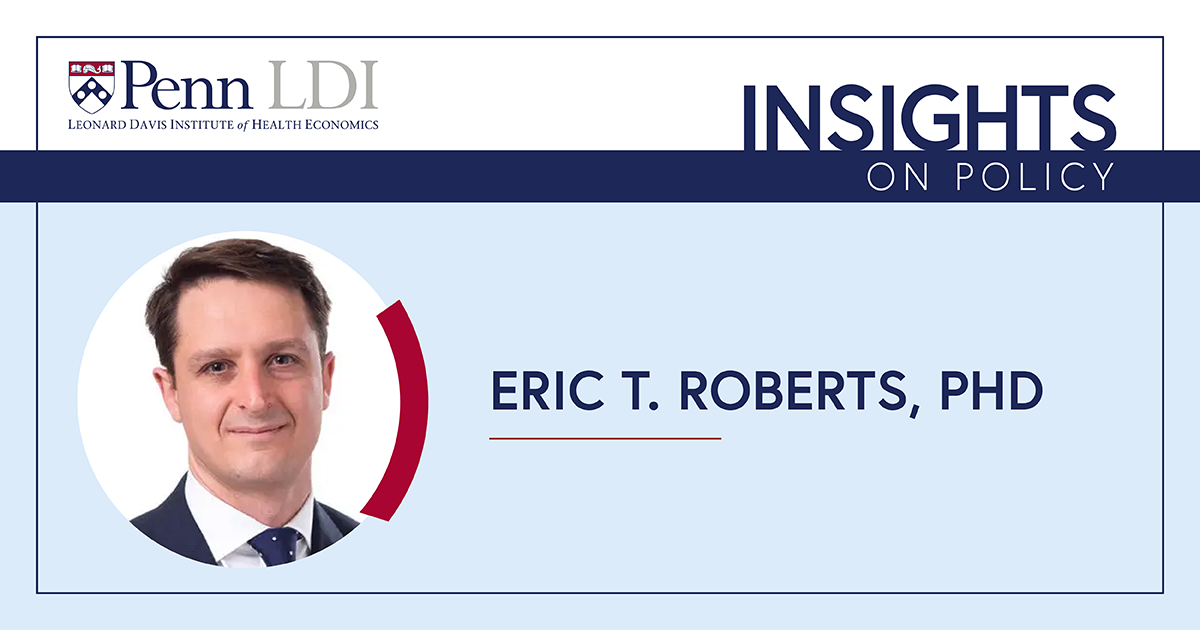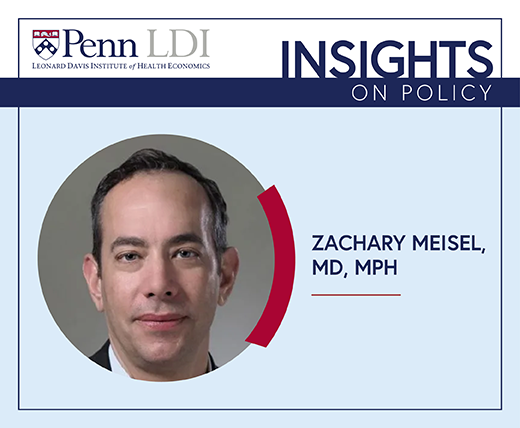
Complementary and Integrative Approaches to Pain Management
Comment: Delivered to the National Center for Complementary and Integrative Health
Policy

In June 2025, LDI Senior Fellow Eric T. Roberts, PhD submitted a response to a Request for Information put out by Senator Bernie Sanders, Ranking Member of the Senate Committee on Health, Education, Labor, and Pensions, detailing the impact of the House Budget Reconciliation Bill on Insurance Coverage.
The response focused on the fifth question included in the Request for Information: “How will rescinding the eligibility and enrollment regulations impact seniors, people with disabilities, and children? Will it result in higher premiums, higher out-of-pocket costs, and higher uninsured rates for these populations?” The response outlines how delaying Medicaid eligibility and enrollment rules could significantly reduce coverage for low-income children, seniors, and people with disabilities, leading to higher out-of-pocket costs, worsened health outcomes, and millions more uninsured by 2034.
Views expressed by the researchers are their own and do not necessarily represent those of the University of Pennsylvania Health System (Penn Medicine) or the University of Pennsylvania.
The Honorable Bernie Sanders
United States Senate
Washington, DC 20510-2105
Dear Senator Sanders and Members of the Senate Committee on Health, Education, Labor, and Pensions,
Thank you for the opportunity to comment on the changes to federal health care programs outlined in the House-passed budget reconciliation bill.
My name is Eric Roberts, and I am an Associate Professor of General Internal Medicine at the University of Pennsylvania’s Perelman School of Medicine. I am also a health economist who studies the delivery and financing of care in U.S. public insurance programs and health care delivery systems. My research encompasses three intersecting areas: 1) health insurance for low-income individuals with Medicare and Medicaid (the “dual eligibles”), 2) Medicare and Medicaid managed care, and 3) the effects of payment and delivery system reform on health care disparities.
My comments are in response to the fifth question included in the Request for Information: How will rescinding the eligibility and enrollment regulations impact seniors, people with disabilities, and children? Will it result in higher premiums, higher out-of-pocket costs, and higher uninsured rates for these populations?
Sections 44101 and 44102 of the budget reconciliation bill passed by the US House of Representatives (H.R. 1) would delay implementation until 2035 of Medicaid eligibility and enrollment rules finalized by the Biden administration. According to the Congressional Budget Office, these provisions of the budget bill will reduce Medicaid and CHIP enrollment among children, seniors, and people with disabilities. Medicaid and CHIP provide health coverage at low or no cost to enrollees, enabling those with low incomes to access health care. In addition, 10 million low-income seniors and people with disabilities have Medicaid coverage through the Medicare Savings Programs, which lower premiums and out-of-pocket costs for health services covered by Medicare.
The CBO estimates a drop of 600,000 people who have CHIP or Medicaid primary coverage (due to Section 44202 of H.R. 1) and 1,380,000 people enrolled in the Medicare Savings Programs (due to Section 44101 of H.R. 1). Reducing coverage through these programs would lead to substantial increases in out-of-pocket costs for children, older adults, and people with disabilities. For children, it could lead to a loss of health insurance altogether, increasing health care costs for low-income families or putting essential care for children out of reach. There is strong evidence that Medicaid coverage improves the health of children, in addition to improving later-life health and education outcomes. Thus, a loss of CHIP and Medicaid coverage among children could have serious and long-lasting effects on health, education, and long-term economic productivity.
For older adults and people with disabilities, loss of coverage through the Medicare Savings Programs would result in low-income Medicare beneficiaries losing premium support for Medicare coverage and having higher out-of-pocket costs for hospital care and doctor’s office visits. Our research shows that loss of the Medicare Savings Programs increases out-of-pocket costs, by over $1,100 per person per year, and reduces the likelihood that individuals visit the doctor or fill medications for chronic health conditions. Reduced enrollment in the Medicare Savings Programs will also decrease the number of Medicare beneficiaries receiving Part D low-income subsidies that reduce prescription drug costs. Loss of access to affordable drug coverage leads to an increase in deaths among low-income older adults and people with disabilities.
Other provisions of H.R. 1 are also expected to result in additional insurance coverage losses. CBO projects that, in total, the bill will result in 10.9 million fewer people having health insurance by 2034. These projections underscore the bill’s potential to have substantial impacts on coverage and population health, including the effects of delaying Medicaid eligibility and enrollment regulations.
Thank you for the opportunity to use this evidence to inform your work.
Sincerely,

Eric T. Roberts, PhD
Senior Fellow, LDI
Associate Professor, Division of General Internal Medicine
eric.roberts@pennmedicine.upenn.edu
Views expressed above are my own and do not necessarily represent those of the University of Pennsylvania Health System (Penn Medicine) or the University of Pennsylvania.

Comment: Delivered to the National Center for Complementary and Integrative Health

Comment: Submitted to the U.S. Department of Veterans Affairs

Comment: Delivered to the U.S. Department of Labor

Memo: Delivered to the U.S. Food and Drug Administration (FDA)

Letter: Delivered to House Speaker Mike Johnson and Majority Leader John Thune

Letter: Delivered to House Speaker Mike Johnson and Majority Leader John Thune